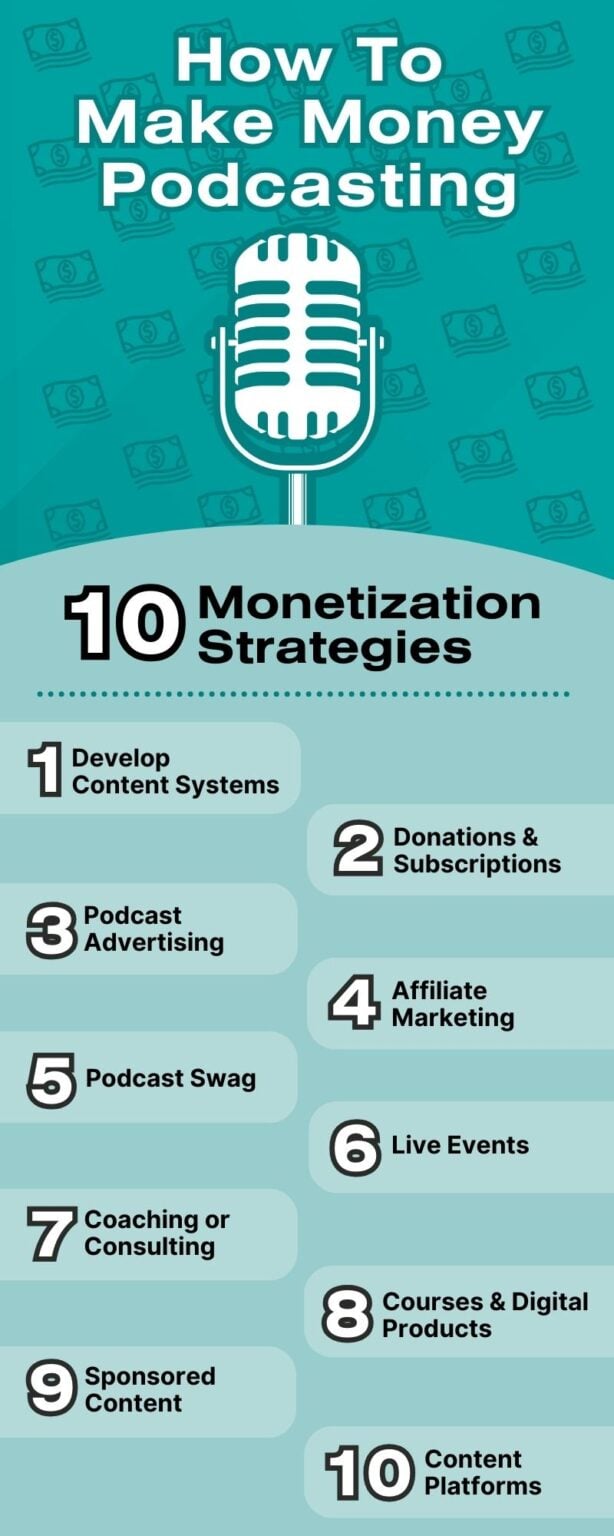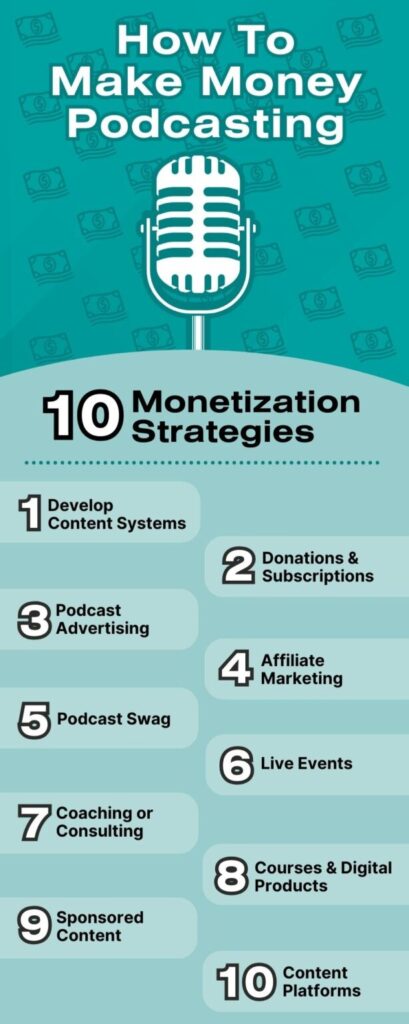Picture this: your podcast reaching thousands of enthusiastic listeners while simultaneously generating a steady stream of income. With over 2 million active podcasts globally, the landscape for monetization has never been more fertile. This unprecedented growth has opened myriad avenues for creators to capitalize on their unique audio content.
Historically, podcast monetization was a challenge, but today, strategies like sponsorship deals and affiliate marketing have become game-changers. Sponsorship alone accounted for $842 million in podcast ad spending in the U.S. in 2020. Complementing this, premium content subscriptions and listener donations are reshaping revenue models, allowing podcasters to diversify their income streams effectively.

Monetizing Your Podcast: Popularity is not Always Required
Many podcasters believe they need millions of listeners to make money. However, even a small but loyal audience can be profitable. The key lies in engaging content and understanding your audience’s needs.
One common strategy is to focus on niche topics. These attract a specific group of dedicated listeners. This targeted audience is often more valuable to advertisers than a larger, less engaged one.
Listener support is another great way to earn money. Platforms like Patreon allow fans to contribute financially. Listeners who value your content are often willing to pay for exclusive perks.
Finally, merchandise can also bring in revenue. Selling items like T-shirts or mugs featuring your podcast’s logo can add to your income. It’s another way to engage your audience and promote your brand.
Sponsored Episodes: Tailoring Advertisements to Your Content
Sponsored episodes involve integrating advertisements within your podcast content. It’s important to ensure these ads align with your podcast’s theme. This keeps your listeners engaged and maintains your show’s integrity.
Finding the Right Sponsors
Identify companies that resonate with your audience. Look for businesses whose products or services align with your podcast’s theme. Sponsors should add value to your content, not detract from it.
Reach out to potential sponsors with a proposal. Highlight your podcast’s strengths and audience demographics. Show them how their brand fits into your show.
Creating Engaging Ads
Work with sponsors to develop ads that feel natural. Use conversational tones instead of scripted lines. Incorporate personal experiences or testimonials to make the ads more relatable.
Place ads strategically within your episodes. Mid-roll ads, inserted in the middle of the content, often have higher engagement rates. This placement ensures listeners hear the advertisement.
Tracking Ad Performance
Monitor the success of your sponsored episodes. Use metrics like click-through rates and listener feedback. This data helps improve future ad placements and relationships with sponsors.
Adjust your strategies based on the performance data. Be open to tweaking your approach to maximize efficiency. Maintaining a transparent relationship with sponsors is crucial.
The Power of Listener Support: Crowdfunding and Direct Contributions
Listener support can be a game changer for podcasters. Platforms like Patreon let your fans support you financially on a regular basis. This consistent income can cover production costs and other expenses.
Crowdfunding campaigns are another option. Sites like Kickstarter or GoFundMe can help you raise funds for special projects. These platforms allow your audience to contribute to your growth.
You can offer different tiers of support. Each tier can have unique rewards, like behind-the-scenes content or exclusive episodes. These perks motivate listeners to contribute more.
Engage with your supporters regularly. Thank them for their contributions and keep them updated on your podcast’s progress. Building a community boosts loyalty and continual support.
Subscription Models and Premium Content: Offering More to Your Listeners
Subscription models let you offer special content to paying listeners. This can include ad-free episodes, early access, or exclusive shows. These extras make your loyal fans feel valued.
Platforms like Apple Podcasts Subscriptions and Spotify allow podcasters to manage subscriptions easily. These platforms handle payments and distribution. This simplifies the process for podcasters.
Providing premium content can boost your revenue. Listeners are often willing to pay for extra value. Unique content differentiates your podcast from others.
One way to structure your subscription offers is through tiered plans. Each tier can have different benefits and price points. This gives listeners options based on their budget.
Engaging with your subscribers is crucial. Regularly update them with new content and perks. Keeping communication open builds a stronger community.
Finally, promote your subscription options on your main podcast. Let your audience know what they gain by subscribing. This can encourage more listeners to join.
Diversifying Income Streams: Merchandise and Affiliate Marketing
Expanding your revenue streams can make your podcast more profitable. Selling merchandise is a popular way to do this. Items like T-shirts, mugs, and stickers promote your brand while generating income.
Selecting the right products is crucial. Choose items that resonate with your audience. Quality merchandise can strengthen your connection with listeners.
Affiliate marketing is another effective strategy. By promoting products or services that fit your podcast’s theme, you can earn commissions. This adds value to your content while making money.
Here are some tips for affiliate marketing success:
- Select products you genuinely believe in
- Integrate recommendations naturally into your content
- Be transparent with your audience about affiliate partnerships
Balanced income streams reduce risk. If one source dries up, others can compensate. Diversification ensures more stable and sustainable earnings for podcasters.
Frequently Asked Questions
Podcast monetization can seem complex, but understanding key strategies can make it simpler. Here are some frequently asked questions to help you navigate this journey.
1. How do I get sponsors for my podcast?
To attract sponsors, first identify companies that align with your podcast’s theme and audience. Create a compelling pitch highlighting your listener demographics, engagement rates, and why their product fits your show.
You can also join podcast networks or platforms designed to connect podcasters and advertisers, such as Midroll or Podcorn. These networks often make the process seamless by handling negotiations and contracts on your behalf.
2. What types of premium content can I offer to subscribers?
Premium content can include ad-free episodes, exclusive interviews, behind-the-scenes content, early access to episodes, and special bonus episodes. Offering unique experiences makes subscribers feel valued and keeps them engaged.
You might also consider live Q&A sessions or interactive content that allows listeners to contribute ideas or participate in discussions. Experiment with different types of premium content to see what resonates most with your audience.
3. How effective is listener support through platforms like Patreon?
Listener support through platforms like Patreon is highly effective for many podcasters. It provides a steady income stream directly from fans who value your content.
The key is to offer meaningful rewards and maintain regular communication with supporters. This fosters a strong sense of community and encourages ongoing contributions.
4. What should I consider when selling merchandise for my podcast?
Select items that resonate with your audience and reflect the spirit of your podcast—T-shirts, mugs, stickers, etc., all work well if they feature catchy designs or slogans from your show.
Quality matters too; ensure that the products are durable and visually appealing. Using print-on-demand services can simplify inventory management while providing flexibility in design offerings.
5. How does affiliate marketing work for podcasters?
Affiliate marketing involves promoting third-party products related to your podcast’s theme. You earn a commission whenever a listener purchases through your unique referral link.
Be transparent about these partnerships to maintain trust with your audience. Choose affiliate products you genuinely believe in so recommendations feel authentic and valuable to listeners.
Conclusion
Monetizing a podcast involves exploring various strategies to generate income. From sponsored episodes and premium content to listener support and merchandise, these methods can provide sustainable revenue. Experimenting with different approaches can help identify what works best for your unique audience.
By understanding and implementing these strategies, podcasters can turn their passion into a profitable venture. Building a loyal listener base and offering value are key to long-term success. With the right approach, your podcast can thrive financially while delivering exceptional content.

